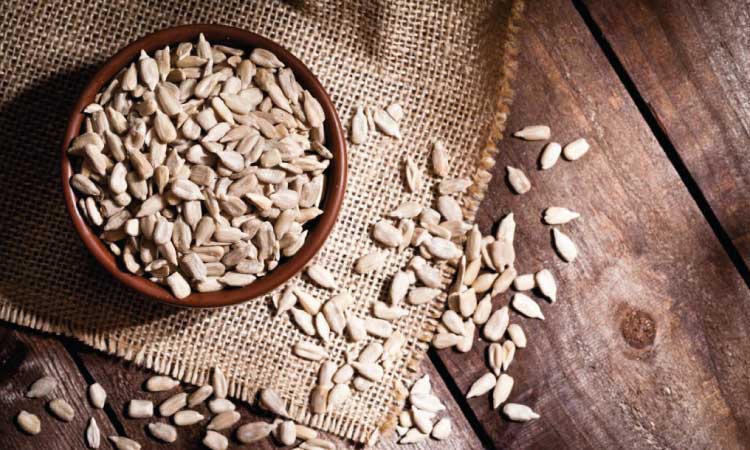To ensure a healthy and happy pregnancy, it is important to consume nutrient-rich foods. It is quite possible that as you are searching for healthy food items to consume while pregnant, you have come across the benefits associated with sunflower seeds. Over the past few years, sunflower seeds have gained popularity as a nutritious and delicious snack all over the world. But is it safe to consume sunflower seeds during pregnancy? Pregnant women can benefit greatly from consuming seeds, as this is one of the best ways to stay fit while pregnant. There are, however, a number of things you need to keep in mind regarding how to eat sunflower seeds during pregnancy.
What Are Sunflower Seeds?
Sunflower seeds, as their name suggests, are the seeds of sunflowers. In the sunflower plant, the sunflower seeds are taken from the heads of the flowers. The seeds of sunflowers are white and tender, enclosed in a black and white striped relatively hard shell. Sunflower seeds are known for their distinctive taste, which is nutty and packed with nutrients. They can be eaten raw, or roasted, or they can be used in other dishes.
Generally speaking, sunflower seeds fall into two categories:

- Sunflower seeds we eat
- Sunflower seeds that used to make oil
Each sunflower seed variety contains its unique combination of monounsaturated, saturated, and polyunsaturated fats.
Can I Eat Sunflower Seeds During Pregnancy?
Sunflower seeds rank among the highest in folate and other nutrients of all nuts and seeds. In other words, sunflower seeds (in moderation) are not only completely safe but also highly beneficial to consume during pregnancy. It is safe to eat raw sunflower seeds during pregnancy. However, sprouted sunflower seeds can cause salmonellosis.
Sunflower seeds can be an easy and nutritious way to satisfy unexpected cravings during pregnancy. They are small and convenient to carry in your handbag when you need them. If your doctor approves, you can consume sunflower seeds every day during your pregnancy. Just be careful that you don’t eat more than the recommended daily amount, which is one ounce which is approximately 30 grams or ¼ of a cup1.
Related Reading: Flax Seeds During Pregnancy – Nutritional Profile, Benefits, Risks, And Precautions
Nutritional Facts Of Sunflower Seeds
Sunflower seeds are a good source of many vitamins and minerals like copper, zinc, phosphorus, manganese, and selenium which can greatly benefit your health. There is a significant amount of healthy fat and fibers in these tiny seeds. Polyunsaturated fats, proteins, phytochemicals, and antioxidants are abundant in them. Sunflower seeds are especially high in vitamin E and folate, which is why they are regarded as one of the pregnancy superfoods. They are also quite calorie-dense.
Calculate Due Date With LMP
According to a source, here is a list of the vitamins, minerals, and fatty acids found in 100 grams of sunflower seeds:
- There are a lot of calories in sunflower seeds. Around 100 grams of these seeds are capable of supplying you with around 585 calories of energy
- Their fiber content (8.5 grams) and fat content (51.5 grams) are satisfactory
- A majority of the fats present in this food are polyunsaturated and monounsaturated, both of which are considered healthy fats
- In addition, they are rich in protein (21 g)
- Vitamin B6, vitamin C, vitamin E, and riboflavin are all found in sunflower seeds, and they also contain folate and choline
- They are rich in minerals such as calcium, iron, magnesium, manganese, phosphorus, potassium, sodium, zinc, etc
- Consuming sunflower seeds also provides plant compounds such as flavonoids and phenolic acids, which are powerful antioxidants
What Are The Benefits Of Eating Sunflower Seeds In Pregnancy?
The Health benefits of sunflower seeds include lowering your risk of developing diseases such as high blood pressure or heart disease. The nutrients they contain can also boost your immune system and boost your energy levels.
The following are some of the health benefits of sunflower seeds during pregnancy:
1. Helps to ease morning sickness
Vitamin B6 and magnesium are two essential nutrients that have been shown to keep nausea at bay. Sunflower seeds are high in these two nutrients. Moreover, its mild flavors make them great snacks for fighting nausea throughout your pregnancy. Pregnant women should eat sunflower seeds at night to reduce morning sickness, as the effect takes at least six hours to show2.
2. Boosts immunity

Sunflower seeds can boost the immune system. This is primarily due to the presence of vitamin E, zinc, and selenium in them. The presence of vitamin E enhances immune function and protects against an array of diseases. Zinc aids the immune system in maintaining and developing immune cells. Selenium is a mineral that has anti-inflammatory properties, inhibits infection, and boosts immunity. Phytochemicals in the sunflower seeds help to keep the immune system strong throughout pregnancy3.
3. Keeps blood pressure in check
Maintaining blood pressure during pregnancy is extremely important. Sunflower seeds contain a compound that blocks an enzyme responsible for constricting blood vessels. Aside from that, sunflower seeds contain plenty of unsaturated fatty acids, such as linoleic acid. Our bodies produce a hormone-like compound from linoleic acid that allows blood vessels to relax, lowering blood pressure. Thus, eating sunflower seeds during pregnancy will help to lower blood pressure by relaxing the blood vessels. Sunflower seeds also contain magnesium, which also lowers blood pressure levels4.
4. Enhances bone strength
Pregnant women should pay attention to bone health. Without proper bone health care, the mothers are more likely to develop osteoporosis. Sunflower seeds have alkaline properties. Ideally, alkaline foods will inhibit the degradation of bones5. These amazing seeds are a good source of manganese and copper. These two minerals are necessary for cartilage and bone to synthesize connective tissue.
By including sunflower seeds in a pregnant woman’s diet, she will benefit from increased bone density and reduce her risk of developing osteoporosis in the future. Copper also helps form strong and flexible joints, which is important during pregnancy.
Sunflower seeds contain phosphorus, which helps with fetal bone development. Moreover, sunflower seeds contain minerals, including manganese, magnesium, copper, and vitamin K, which are beneficial for the unborn child’s bone development6.
Related Reading: 18 Foods To Eat To Increase Fetal Weight During Pregnancy
5. Helps to combat anemia
Pregnant women are more likely to suffer from iron deficiency, which can lead to anemia, fatigue, and infection. Having one ounce of sunflower seeds each day satisfies around 10% of the iron requirement7.
6. Sunflower seeds and folic acid
The sunflower seeds are an excellent source of folates. The folic acid requirement increases in pregnancy, so sunflower seeds can be a great addition to a pregnancy diet. By consuming adequate amounts of folic acid in the first trimester of pregnancy, neural tube defects such as anencephaly and spina bifida can be prevented. Folic acid during pregnancy is important for the production of red blood cells and for transporting oxygen from the lungs to other parts of the body, including the placenta.
7. Enhance gastrointestinal health
Sunflower seeds contain a lot of dietary fiber. By bulking up the stool and facilitating peristaltic movement of the intestines, dietary fiber aids digestion. Taking this seed also improves the balance of bacteria in the gut, which makes the absorption of nutrients more efficient8.
8. Helps to boost energy
Sunflower seeds naturally boost your energy levels because of their high protein content. The seeds of sunflowers are also an excellent source of thiamine (vitamin B1). Pregnant women facing bouts of fatigue during pregnancy benefit greatly from thiamine because it helps convert food into energy. You can get instant energy by consuming a handful of sunflower seeds. A component of sunflower seeds called selenium increases blood flow and oxygen delivery to different the body. This also helps to enhance the energy levels.
9. Promotes thyroid function
During pregnancy, the thyroid gland needs to function optimally. Sunflower seeds are high in selenium, which is essential for thyroid function9. Sunflower seeds also contain zinc in significant amounts. Copper is also present. Hypothyroidism has been linked to low zinc levels. Low copper levels may also contribute to thyroid disorders10.
Risks Of Eating Sunflower Seeds When Pregnant

Excessive consumption of sunflower seeds during pregnancy can be harmful to a woman’s health despite its nutritional benefits. The following are some risk factors to be aware of:
- Sunflower seeds contain high levels of phosphorus, which can cause kidney damage as well as other non-skeletal issues
- Constipation, vomiting, and stomach aches are possible side effects of sunflower seeds during pregnancy if consumed in excess
- Cadmium content is another reason why sunflower seeds should be consumed in moderation. Sunflower plants typically absorb cadmium from the soil and deposit it in their seeds, therefore sunflower seeds contain higher amounts compared to most other foods. If exposed to high amounts over an extended period, this metal can harm the kidneys
- Selenium is found in a significant amount in sunflower seeds. If too much selenium is consumed, it can lead to brittle hair and nails, rashes, fatigue, and irritability
- Sunflower seeds are high in calories. They can contribute to weight gain if consumed in excess
- Sprouting sunflower seeds poses a high risk of salmonella contamination
Related Reading: Being Overweight During Pregnancy- 10 Potential Complications
Safe Practices When Eating Sunflower Seeds During Pregnancy
The following guidelines should be followed when eating sunflower seeds during pregnancy:
- Both shelled and unshelled sunflower seeds are available in the market. There is a lot of fiber in the shells, but they are very hard, and if they are not chewed well, they can damage the digestive system
- It is best to consume shelled sunflower seeds since they can easily be consumed and added to other dishes
- Sunflower seeds should not be consumed in excess, restrict them to 30 grams per day. That is 1 ounce or about 1/4 cup
- To destroy harmful bacteria, sunflower seeds must be dried at higher temperatures
- The high-fat content in sunflower seeds makes them prone to rancidity. To prevent this, store them in an airtight container in the refrigerator or freezer
- Salted sunflower seeds have a high salt content. so, it’s important to read labels
- It is better to avoid salted sunflower seeds during pregnancy as they can contribute to high blood pressure and other related complications
Conclusion

A healthy pregnancy depends on good nutrition. You may think sunflower seeds are tiny, but they are packed with some impressive benefits. Pregnant women can boost their nutrition intake by adding crushed sunflower seeds to their meals, desserts, or salads. The seed has a lower likelihood of causing an allergic reaction. While it is healthy, excess of it can undo its potential and cause problems.
